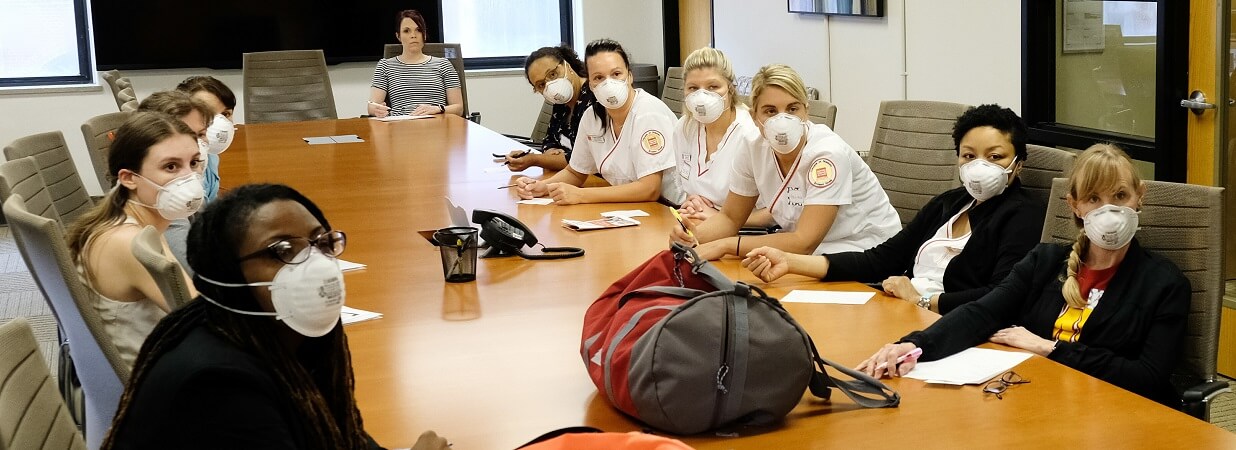Nurses who already have a graduate degree in nursing are eligible to take coursework to achieve a post-graduate certificate in an area of Advanced Nursing Practice.
At the end of the program, Nurse Practitioner students are eligible to take the examination for certification in one of the populations of focus. Post-graduate curricula focus on the core graduate content for the role and population. The length of the program and the specific plan of study for each student will vary, depending on the student's previous academic coursework and the student's proposed Advanced Practice Role. The average part-time student can complete the certificate in one to two years.
The curriculum for post-graduate certificates are individualized on a per-student basis. UMSL offers post-graduate certificates in the following areas:
The role of the AGNP is to provide primary care to adults from youth (14 years of age) through geriatrics with an in-depth knowledge and experience in the primary health care needs for well-person care and the prevention/management of common adult acute illnesses and chronic conditions. This primary care is provided to support the optimal health of adults within the context of their family, community, and environmental setting. Although AGNPs practice primarily in private practices and ambulatory clinics, their scope of practice may also extend into the residential care and inpatient settings and is based upon the needs of the patient.
The graduate of an FNP program is prepared to provide primary care for individuals and families across the lifespan. The FNP role includes preventative healthcare as well as the assessment, diagnosis and treatment of acute and chronic illness, and preventative health care for individuals and families. Family nurse practitioners demonstrate a commitment to family–centered care and understand the relevance of the family’s identified community in the delivery of family-centered care. (AACN, 2013)
A graduate of the PNP-AC program is prepared to care for children with complex acute, critical, and chronic illness across the entire pediatric age spectrum, from birth to young adulthood. Circumstances may exist in which a patient, by virtue of age, could fall outside the traditionally defined PNP-AC population, but by virtue of special need, the patient is best served by the PNP-AC. The PNP-AC implements the full scope of the role through assessment, diagnosis, and management with interventions for patients and their families. The PNP-AC provides care to patients who are characterized as “physiologically unstable, technologically dependent, and/or are highly vulnerable to complications” (AACN Scope and Standards, 2006, p. 9), and a continuum of care ranging from disease prevention to critical care in order to “stabilize the patient’s condition, prevent complications, restore maximum health, and/or provide palliative care” (AACN p. 10). Patients may be encountered across the continuum of care settings and require ongoing monitoring and intervention. (AACN, 2013)
The role of the PNP-PC is to provide primary care to children from birth through young adult with an in-depth knowledge and experience in pediatric primary health care including well-child care and prevention/management of common pediatric acute illnesses and chronic conditions. This care is provided to support optimal health of children within the context of their family, community, and environmental setting. Although PNP-PC practice primarily in private practices and ambulatory clinics, their scope of practice may also extend into the inpatient setting and is based upon the needs of the patient. (AACN, 2013)
The PMHNP focuses on individuals across the lifespan (infancy through old age), families, and populations across the lifespan at risk for developing and/or having a diagnosis of psychiatric disorders or mental health problems. The PHMNP provides primary mental health care to patients seeking mental health services in a wide range of settings. Primary mental health care provided by the PMHNP involves relationship-based, continuous, and comprehensive services necessary for the promotion of optimal mental health, prevention, and treatment of psychiatric disorders and health maintenance. This includes assessment, diagnosis, and management of mental health and psychiatric disorders across the lifespan. (AACN, 2013)
The WHNP provides primary care to women across the life cycle with emphasis on conditions unique to women from menarche through the remainder of their life cycle within the context of sociocultural environments – interpersonal, family, and community. In providing care, WHNP considers the inter-relationship of gender, social class, culture, ethnicity, sexual orientation, economic status, and socio-political power differentials. (AACN, 2013)
Getting Started
Program Resources
Frequently Asked Questions
Funding Your Education
Scholarships and Loans
Non-Missouri Residents: Prospective students are responsible for reviewing the UMSL state authorizations page to see if this program is offered in their state throughout their program and to review the licensure or certification requirements for the state in which they reside.

